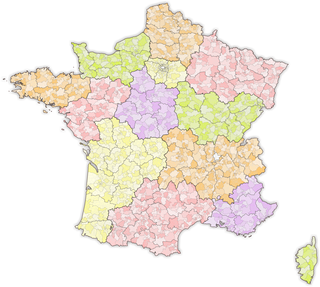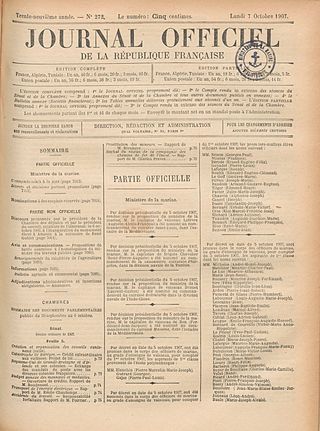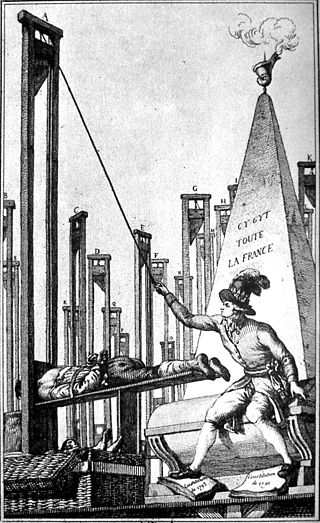
The cantons of France are territorial subdivisions of the French Republic's departments and arrondissements.

The Official Journal of the French Republic, also known as the JORF or JO, is the government gazette of the French Republic. It publishes the major legal official information from the national Government of France, the French Parliament and the French Constitutional Council.

Louis Marie de La Révellière-Lépeaux was a deputy to the National Convention during the French Revolution. He later served as a prominent leader of the French Directory.
The Law of Suspects was a decree passed by the French National Convention on 17 September 1793, during the French Revolution. Some historians consider this decree the start of the Reign of Terror; they argue that the decree marked a significant weakening of individual freedoms that led to "revolutionary paranoia" that swept the nation.

The Law of 22 Prairial, also known as the loi de la Grande Terreur, the law of the Great Terror, was enacted on 10 June 1794. It was proposed by Georges Auguste Couthon but seems to have been written by Maximilien Robespierre according to Laurent Lecointre. Using this law, the Committee of Public Safety simplified the judicial process to one of indictment and prosecution.

France has one official language, the French language. The French government does not regulate the choice of language in publications by individuals, but the use of French is required by law in commercial and workplace communications. In addition to mandating the use of French in the territory of the Republic, the French government tries to promote French in the European Union and globally through institutions such as La Francophonie. The perceived threat from Anglicisation has prompted efforts to safeguard the position of the French language in France.

The Revolutionary Tribunal was a court instituted by the National Convention during the French Revolution for the trial of political offenders. In October 1793, it became one of the most powerful engines of the period often called the Reign of Terror.

Gabriel Bonnot de Mably, sometimes known as Abbé de Mably, was a French philosopher, historian, and writer, who for a short time served in the diplomatic corps. He was a popular 18th-century writer.
The droit d'auteur or French authors' rights law, is in the jurisdiction of France a set of exclusive prerogatives available to a creator over his or her intellectual work, as part of the intellectual property area of law. It has been very influential in the development of authors' rights laws in other civil law jurisdictions, and in the development of international authors' rights law such as the Berne Convention. It has its roots in the 16th century, before the legal concept of copyright was developed in the United Kingdom. Based on the "rights of the author" instead of on the right to copy, its philosophy and terminology are different from those used in copyright law in common law jurisdictions. The term droit d’auteur reveals that the interests of the author are at the center of the system, not that of the investor.

Monument historique is a designation given to some national heritage sites in France. It may also refer to the state procedure in France by which national heritage protection is extended to a building, a specific part of a building, a collection of buildings, a garden, a bridge, or other structure, because of their importance to France's architectural and historical cultural heritage. Both public and privately owned structures may be listed in this way, as well as movable objects. As of 2012, there were 44,236 monuments listed.
The Gayssot Act or Gayssot Law, enacted on 13 July 1990, makes it an offence in France to question the existence or size of the category of crimes against humanity as defined in the London Charter of 1945, on the basis of which Nazi leaders were convicted by the International Military Tribunal at Nuremberg in 1945–1946.

The Chamber of Deputies is the lower house of Haiti's bicameral legislature, the Haitian Parliament. The upper house of the Haitian Parliament is the Senate of Haiti. The Chamber has 119 members who are elected by popular vote to four-year terms. There are no term limits for Deputies; they may be re-elected indefinitely.
Publication right is a type of copyright granted to the publisher who first publishes a previously unpublished work after that work's original copyright has expired. It is in almost all respects the same as standard copyright, but excludes moral rights. Publication right is mainly found in the law of European countries and has no direct correspondence in US copyright law. Within the European Union, not all countries originally had such a right, and where it was provided terms varied, but in 1993 national laws were required to be harmonized by EU Directive 93/98/EEC to provide standard period of protection of 25 years from first publication.

Prostitution in France was legal until April 2016, but several surrounding activities were illegal, like operating a brothel, living off the avails (pimping), and paying for sex with someone under the age of 18.

The politics of France take place within the framework of a semi-presidential system determined by the French Constitution of the French Fifth Republic. The nation declares itself to be an "indivisible, secular, democratic, and social Republic". The constitution provides for a separation of powers and proclaims France's "attachment to the Rights of Man and the principles of National Sovereignty as defined by the Declaration of 1789".

The Conseil national du numérique is a French independent advisory commission created on 29 April 2011 by the French presidential decree n°2011-476. It was reorganized and expanded by another French presidential decree on 13 December 2012, to expand its spectrum of actions to all the questions set up by the development of the digital in society and economy. The council issues independent opinions and recommendations on any question relating to the impact of digital technologies on economy and society. The government can consult the council on new legislation or draft regulations.

The Systematic Compilation of Federal Legislation (SR) (German: Systematische Sammlung des Bundesrechts, SR; French: Recueil systématique du droit fédéral, RS; Italian: Raccolta sistematica, RS) is the official compilation of all Swiss federal laws, ordinances, international and intercantonal treaties that are in force.
The Friends of the Natural History Museum is a French non-profit organisation, created in 1907 and recognized as a charity in 1926. Its purpose is to give practical and financial support to the Muséum national d’Histoire naturelle in Paris, France, enrich its collections, zoo, laboratories, greenhouses, gardens and libraries, and to promote scientific research and education related to it.

The history of prostitution in France has similarities with the history of prostitution in other countries in Europe, namely a succession of periods of tolerance and repression, but with certain distinct features such as a relatively long period of tolerance of brothels.
Corps de droit ottoman; recueil des codes, lois, règlements, ordonnances et actes les plus importants du droit intérieur, et d'études sur le droit coutumier de l'Empire ottoman is a 1905–1906 seven-volume French-language collection of Ottoman Empire law edited by George Young (1872–1952), published by Clarendon Press in the United Kingdom.













